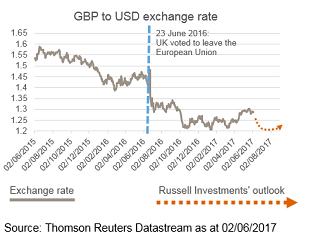UK Election: The greatest surprise in politics
- Shock result as Labour defies the odds with Jeremy Corbyn set to be prime minister. Brexit negotiations over the single market could prove easier
- Markets are likely to wobble at first, but we may see sterling, UK equites and gilt yields rise eventually
- Investors should prepare for increased market volatility as we expect a bumpy road to Brexit
- Russell Investments’ Multi-Asset funds have no structural overweight allocation to UK assets
The campaign
The election campaign turned out to be a lot more interesting than many expected when Prime Minister May announced her wish to hold a snap election. At the time, the Conservatives were almost 20% ahead in the polls and it seemed as though the British public overwhelmingly favoured Theresa May over Labour-leader Jeremy Corbyn to deliver Brexit negotiations. As a result, the media and political analysts widely expected a resounding victory and an increased Conservative majority in the House of Commons to more than 100 seats.
But then the campaigns got under way…To everyone’s surprise the Conservatives were quickly put on the defensive about hot topics like social care, while Labour found traction on issues such as education and housing. This reversal and subsequent narrowing of the polls turned a coronation into a battle. In the end, however, that battle was won by a surprise victor.
Brexit negotiations
It was thought impossible but Labour and Jeremy Corbyn are victorious. Mr Corbyn has stated that he will firmly argue for the single market, how that will manifest we don’t know. In any case, the UK’s departure from the European Union looks set to be delayed or turned into a very Soft Brexit.
What are the implications for UK assets?
Sterling
Since the referendum on 23 June 2016, the British pound exchange rate has been the best barometer for the market’s perception of the risks and opportunities.
After falling more than 15% in trade-weighted terms during 2016, sterling recovered almost 8% over 2017. However, it quickly fell back by 3% in May as the Conservative polls started to narrow during the run up to the election.
Looking ahead, we think the pound will fall but could recover relatively quickly given the prospect for a softer Brexit (see chart).

‘The main conduit for changes in asset prices will be via sterling, and here the effect will be limited to the UK stock market. As a global, investor we have only a small amount of UK equities. Our foreign currency positions are largely hedged so any strength today from sterling should have a limited effect on our portfolios.’
- David Vickers, manager of the Multi-Asset Growth Portfolio
Gilts
In such an environment, we project that 10-year gilt yields will rise eventually due to the Labour party’s expansionary fiscal policy, which may also cause the rating agencies to review the UK’s credit rating.
"We are not looking to take a position in either event [Conservative or Labour victory]. The funds will continue with their strategy of harvesting credit risk premium in the most inefficient spots of the market, while managing drawdown risk with target diversifiers to deliver a smoother return profile.’’
- Adam Smears, Head of Fixed Income Research
Economic outlook
Our bottom line is that whilst this general election result feels like a crucial event for those in the UK, it does not carry with it the same market significance as others have over the past year, namely the French or Italian elections. Indeed, the post-Brexit economy has done well so far, but we continue to believe that the slowdown in corporate and housing investment, in combination with downward pressure on real wage growth, will slow economic growth in 2017 and 2018.